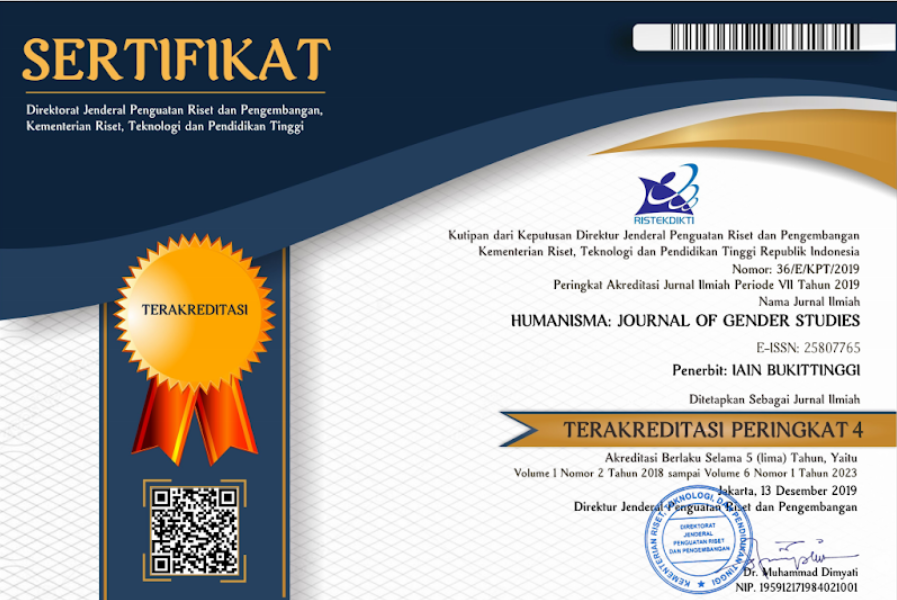The Face of Women in Cases of Domestic Violence in Indonesia According to the Ethics of the Levinasian
DOI:
https://doi.org/10.30983/humanisma.v8i1.8318Keywords:
women, Levinasian face ethics, face, law, others.Abstract
This article focuses on the face of women in Levinasian face ethics. The author raises issues related to the increasing phenomenon of violence against women in Indonesia. This fact shows that women in Indonesia are still neglected. According to Levinasian face ethics, this paper intends to criticize the problems that occur from a philosophical point of view. The method of discussion of this paper is a critical analysis of cases of violence against women in the household in the light of Levinasian face ethics. Forms of violence against women in Indonesia are strongly influenced by a patriarchal culture that places the position and status of men above women. This cultural model opens up space for male superiority over women. The concept of Levinasian face ethics is an effective tool in minimizing acts of violence against women in the household. The author arrives at the finding that the root of the problem behind the rampant cases of domestic violence in Indonesia is the failure to understand the existence of women and weak law enforcement. Levinas' ethics of responsibility provide new treasures for understanding Indonesian society, namely that the existence of women is part of everyone's responsibility. A woman's face is how "she" shows herself. I came to the finding that the presence of women in the order of living together demands my responsibility, which is none other than respect for her. It is a form of engagement for the well-being and peaceful lives of others.
References
Adon, Mathias Jebaru, and Vinsensius Rixnaldi Masut. “Dasar Pelayanan Tenaga Medis Bagi Pasien Covid-19 Sebagai Etika Tanggung Jawab Menurut Emmanuel Levinas.†Jurnal Hukum Magnum Opus 5, no. 1 (2022): 53–67.
Andi Prastowo. Metode Penelitian Kualitatif Dalam Perspektif Rancangan Penelitian. Yogyakarta: Ar-Ruzz Media, 2016.
Armada Riyanto. Berfilsafat Politik. Yogyakarta: Kanisius, 2014.
———. Menjadi Mencintai Berfilsafat Teologis Sehari-Hari. Yogyakarta: Kanisius, 2013.
———. Relasionalitas Filsafat Fondasi Interpretasi: Aku, Teks, Liyan, Fenomen. Yogyakarta: Kanisius, 2018.
D. Anugrahbayu. Yang Ada Dan Yang Baik: Platonisme Dalam Pemikiran Emmanuel Levinas. Jakarta: STF Driyakara, 2018.
Editha Soebagio. “Humanisme Bagi Sesama: Menyikap Akar Kekerasan Dalam Relasi Antarmanusia Danetika Tanggungjawab Menurut Emmanuel Levinas.†Prosiding Seri Filsafat Teologi Widya Sasana 30 (2020): 137–57.
Emmanuel Levinas. Ethics and Infinity: Conversations with Phlippe Nemo. Edited by Richard A. Cohen. Pittsburgh: Duquesne University Press, 1982.
———. Otherwise than Being or Beyond Essence. Edited by Alpohonso Lingis. Original w. Pittsburgh: Duquesne University Press, 1998.
F. Budi Hardiman. “Ruang Publik Dan Demokrasi Deliberatif: Etika Politik Jürgen Habermas.†In Empat Esai Etika Politik, edited by Bagus Takwin, 1. Jakarta: Salihara, 2011.
Franz Magnis-Suseno. 12 Tokoh Etika Abad Ke-20. Yogyakarta: Kanisius, 2000.
Hizkia Fredo Valerian. “Perjumpaan Dengan Yang Lain: Refleksi Filosofis Terhadap Film ‘Hotel Rwanda’ Dari Perspektif Etika Emmanuel Levinas.†Jurnal Ledalero 20 (2021): 143–58.
K. Sabon. “Konsep Tanggung Jawab Dalam Filsafat Emanuel Levinas.†Jurnal Filsafat 28 (2018): 47–53.
M. H. Ghufran Kordi. Perempuan Di Tengah Masyarakat Dan Budaya Patriakhi. Yogyakarta: Spektrum Nusantara, 2018.
Muhajarah, Kurnia. “KEKERASAN TERHADAP PEREMPUAN DALAM RUMAH TANGGA: Perspektif Sosio-Budaya, Hukum, Dan Agama.†Sawwa: Jurnal Studi Gender 11, no. 2 (2017): 127. https://doi.org/10.21580/sa.v11i2.1452.
Roger Burggraeve. The Wisdom of Love in the Service of Love: Emmanuel Levinas on Justice,, Peace, and Human Rights. Milwaukee: Marquette University Press, 2002.
T. H. Tjaya. Enigma Wajah Orang Lain: Menggali Pemikiran Emmanuel Levinas. Jakarta: Kepustakaan Populer Gramedia, 2012.
Https://databoks.katadata.co.id/datapublish/2023/12/19/tren-kasus-kdrt-di-indonesia-cenderung-menurun-dalam-lima-tahun-terakhir diakses pada tanggal 17 Maret 2024.
Budiarti Utami Putri, dkk., “Trauma di Ujung Pisau,†Tempo Edisi 6-12 Desember 2021, 31
Downloads
Published
How to Cite
Issue
Section
Citation Check
License
Copyright (c) 2024 Valerianus Wiparlo, Yohanes Endi

This work is licensed under a Creative Commons Attribution-ShareAlike 4.0 International License.
Authors who publish with this journal agree to the following terms:
- Authors retain copyright and grant the journal right of first publication with the work simultaneously licensed under a Creative Commons Attribution-ShareAlike 4.0. that allows others to share the work with an acknowledgment of the work's authorship and initial publication in this journal.
- Authors are able to enter into separate, additional contractual arrangements for the non-exclusive distribution of the journal's published version of the work (e.g., post it to an institutional repository or publish it in a book), with an acknowledgment of its initial publication in this journal.
- Authors are permitted and encouraged to post their work online (e.g., in institutional repositories or on their website) prior to and during the submission process, as it can lead to productive exchanges, as well as earlier and greater citation of published work (See The Effect of Open Access).


